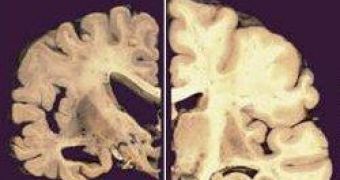It may sound paradoxical, but 'exercised' brains get demented much rapidly than the nerd ones. Highly instructed patients seem to outcome easier dementia symptoms in the first stages, compensating subliminally the deficits through trained "thinking power". University graduates experience memory loss 50 % faster than people with less formal education do.
At the time dementia becomes noticeable, both educational groups may display similar brain damage levels. The main age-related dementia is assigned to Alzheimer's disease, in which the brain stores protein "plaques and tangles". In the early stages, the patients experience speech impairment (difficulty in encountering words), but they gradually evolve towards classic dementia symptoms, memory loss, confusion and agitation.
The team at Albert Einstein College of Medicine of Yeshiva University, New York, investigated 117 subjects who developed dementia and the evolution of the condition. The subjects were born between 1894 and 1908, and their education levels varied from less than three years' schooling to doctoral studies.
The subjects completed annually - on a monitoring period of six years - cognitive questionnaires determining their memory, speech and thinking ability. The data revealed that one added year of formal education hampered the speed of memory loss connected with ongoing dementia by about two and a half months.
But in the condition's final stages, when fast decline starts, higher education translated into a 4 % higher loss rhythm for any added educational year.
A college graduate with 16 years of education, diagnosed with Alzheimer's at age 85, entered into the rapid memory loss process 3.8 years earlier, at age 81, while an individual with just four years of education and diagnosed with the condition at the same age would have started developing a less rapid rate of decline around age 79. "It is well recognized that intelligent dementia victims get symptoms at a later stage than less clever sufferers. Our study showed that a person with 16 years of formal education would experience a rate of memory decline that is 50 % faster than someone with just four years education", said co-author Charles Hall, an associate professor.
"This rapid decline may be explained by how people with more education have a greater cognitive reserve, or the brain's ability to maintain function in spite of damage. So, while they're often diagnosed with dementia at a later date - which we believe may be because of their ability to hide the symptoms - there's still damage to their brain. The better educated do not make a "conscious" effort to hide their failing memory, but are benefiting from greater mental reserves which allow them to compensate for it in the short-term.", Hall added.

 14 DAY TRIAL //
14 DAY TRIAL //